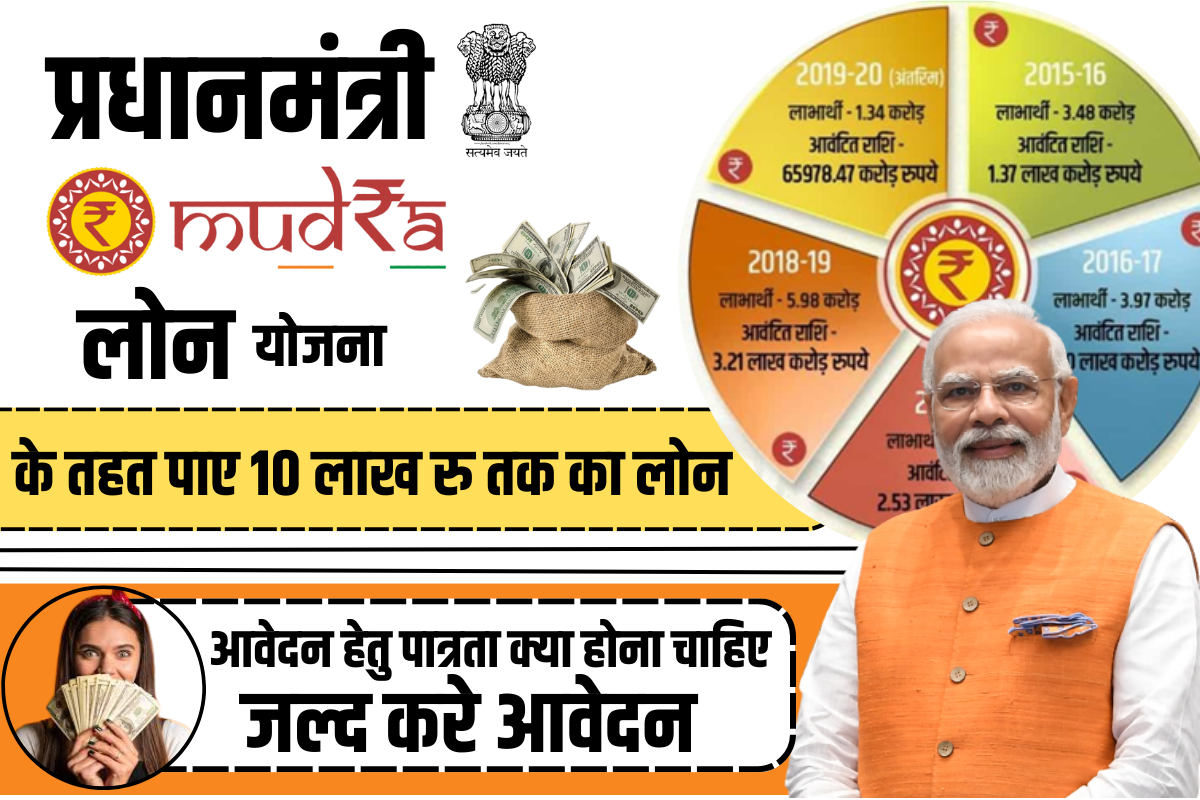Hello friends, welcome to all of you, in this article of ours today, through this article, we are going to tell you all about Pradhan Mantri Mudra Eligibility, some important information like Mudra Loan Interest Rate, PMMY Mudra Loan Apply, what is Or What are the benefits of PM Mudra Yojana Documents, PMMY Mudra Loan Apply, what is the important information related to them, through this article we will tell you, then definitely read till the end and how the information given by us is PMMY Mudra Loan Apply Please tell us in the comment box that PMMY Mudra Loan Apply, how did this information cost you?
PM Mudra Yojana Documents: The MUDRA Bank, proposed by Union Finance Minister Arun Jaitley, is a significant step towards providing funding to those who have been previously overlooked. In this article, we will outline the eligibility criteria for the Pradhan Mantri Mudra Yojana Scheme. Read on to find out more.
Eligibility Requirements for Pradhan Mantri Mudra Yojana Refinance Loan
PM Mudra Yojana Documents: The Micro Units Development and Refinance Agency (MUDRA) has implemented eligibility criteria for different types of banks that serve as partner lending institutions. This allows micro units in the manufacturing, trading, and service sectors in both rural and urban areas to access refinancing options.
A. Public Sector Banks:
- Profitability: Should have earned profit during the last 2 years; failing which, a minimum external rating of long-term instruments not below A-(minus) from accredited credit rating agencies is required.
- Net NPAs: The level of Net Non-Performing Assets (NPAs) should not exceed 15%.
- CRAR Compliance: The bank must meet the Capital to Risk-Weighted Assets Ratio (CRAR) as stipulated by RBI from time to time.
- Networth Requirement: The net worth should be above Rs. 250 crore.
B. Private Sector Banks:
- Profitability: Should have earned profit during the last 2 years; failing which, a minimum external rating of long-term instruments not below A-(minus) from accredited credit rating agencies is required.
- Net NPAs: The level of Net Non-Performing Assets (NPAs) should not exceed 3%.
- CRAR Compliance: The bank must meet the Capital to Risk-Weighted Assets Ratio (CRAR) as stipulated by RBI from time to time.
- Networth Requirement: The net worth should be above Rs. 250 crore.
C. Regional Rural Banks:
- Profitability: Should have earned a net profit for the preceding two years.
- Net NPAs: The level of Net Non-Performing Assets (NPAs) should be equal to or less than 6%.
- CRAR Compliance: The bank must meet the Capital to Risk-Weighted Assets Ratio (CRAR) as stipulated by RBI from time to time.
- Net Owned Fund Requirement: The Net Owned Fund should be above Rs. 50 crore.
1. URBAN COOPERATIVE BANKS:
Urban Co-operative Banks (UCBs) are financial institutions that operate in urban and semi-urban areas in India. They are a subset of co-operative banks and are regulated by the Reserve Bank of India (RBI). Here are some key features and requirements for Urban Co-operative Banks:
To be eligible, the Urban Co-operative Bank (UCB) should meet the following criteria:
-
Operational Experience: The bank should have been in operation for a period of 3 years.
-
Profitability: The bank should have achieved a net profit for at least three out of the preceding four years, except for the immediate preceding year where it should not have incurred a net loss.
-
Micro/Small Business Portfolio: The bank should have a substantial outstanding portfolio related to Micro/Small business entities engaged in manufacturing, trading, and services activities.
-
Strong Fundamentals: The bank should demonstrate strong fundamentals based on the last audited financial statement, including:
- Net worth not less than Rs. 50 crore.
- Capital to Risk Weighted Assets (CRAR) in accordance with RBI guidelines for Financially Sound and Well Managed (FSWM) UCBs.
- Level of Non-Performing Assets (NPAs) not exceeding 3%.
- The bank should not carry any accumulated losses in its books of account.
-
Scheduled Bank Status: The UCB should have the status of a Scheduled Bank.
-
Audit Classification: The bank should have obtained an ‘A’ audit classification as per the last audited statement.
PM Mudra Yojana Documents: Meeting these criteria will enhance the UCB’s eligibility and credibility to operate as a sound and well-managed financial institution.
2. State Co-operative Banks
- Net NPA: The Net Non-Performing Assets (NPAs) should be up to 10% as per the last audited statement.
- Profitability: The bank must have earned a net profit during the last 2 years.
- Accumulated Loss: The bank should not have any accumulated loss in its books of account.
- Audit Classification: The bank should have an ‘A’ category audit classification as per the last audited statement.
- State Co-operative Banks: State Co-operative Banks must maintain a minimum Capital to Risk-Weighted Assets Ratio (CRAR) as stipulated by RBI from time to time.
- Individual DCCBs Affiliated to State CBs: District Central Co-operative Banks (DCCBs) affiliated to State Co-operative Banks, meeting the above CRAR requirements, will be eligible to draw refinance through the State Co-operative banks within the overall exposure limit of the State Co-operative banks.
3. Eligibility Criteria For Micro Finance Institutions
Pradhan Mantri Mudra Eligibility: To be eligible, the Microfinance Institution (MFI) should meet the following criteria:
-
Experience: The MFI should be a registered legal entity lending to micro units meeting the loan size criteria of MUDRA (currently Rs. 1 lakh or as stipulated by RBI) for at least 3 years, or the promoters/management should have an experience of at least 10 years.
-
Borrower Outreach: The MFI should have a minimum outreach of 3000 existing borrowers.
-
Capacity Assessment Rating: Pradhan Mantri Mudra Eligibility The MFI should have received a minimum capacity assessment rating, such as Mfr-4 (equivalent to CRISIL) for TN, Kerala, Karnataka, and Puducherry, Mfr-4 (equivalent to CRISIL) for Tier-I and Tier-II MFIs, and Mfr-5 for Tier-III MFIs in other remaining states.
-
Systems and Processes: The MFI should have suitable systems, processes, and procedures in place, including internal accounting, risk management, internal audit, Management Information System (MIS), and cash management.
-
Target Market: The MFI should target own account enterprises within the micro units category, i.e., businesses run by the owners.
-
Regulatory Compliance: The MFI should meet the minimum Capital to Risk-Weighted Assets Ratio (CRAR) and other norms stipulated by RBI for MFIs registered as NBFC-MFIs and comply with all the prevailing RBI guidelines, including pricing.
-
Performance Track Record: The MFI should have a three-year profitable track record, recovery performance not less than 90%, and Portfolio at Risk (PAR) > 90 days below 5% (relaxable up to 7% on a case-to-case basis) for MFIs.
-
Credit Bureau Membership: The MFI should be a member of credit bureaus as per RBI policy.
-
Term Loan/Refinance Requirement: The MFI should have a minimum term loan/refinance requirement of Rs. 0.50 crore.
-
Target Beneficiaries: The MFI should target the poor, especially women, and should be secular in its operations.
-
Audited Financial Statements: The MFI should have audited financial statements. In the case of an NGO with microfinance as a program, separate audited financial statements for the MFI program are required.
-
Track Record (For NBFCs or MFIs setup for/by taking over existing MF operations): If the MFI is formed by taking over the existing MF operations of another entity, the track record of the earlier entity can be considered for existence, past ratings, etc., subject to continuity of promoters/senior management/transfer of major (> 60%) part of the MF operations of the earlier entity.
-
Utilization of MUDRA’s Loan: The loan provided by MUDRA should be on-lent by the MFIs for use by borrowers in setting up/running non-farm income-generating activities and micro/small enterprises, including trading activities/services.
4. NON BANKING FINANCE COMPANIES (NBFCs)
Non-Banking Finance Companies, commonly known as NBFCs, are financial institutions that provide various financial services similar to banks but do not hold a banking license. These companies play a vital role in the economy by offering loans, credit facilities, investment advice, and other financial products to individuals and businesses.
A. Larger NBFCs (Asset size > Rs. 500 crore):
Registration: The NBFC should be registered with RBI as an Asset Finance Company (AFC) or Loan Company. For NBFC-Loan Company, a CA certificate should be furnished, stating that if the loan is given for income-generating activities, at least 60% of the income comes from productive assets.
Business Experience: The NBFC should have been in business for 5 years and earned a Net Profit for the last 3 years. In the case of NBFCs financing second-hand vehicles, the NBFC needs to have 3 years of experience in the activity and recorded profit during the period.
Financial Requirements:
- Minimum Net Owned Fund: Rs. 20 crore.
- Minimum Asset size: Rs. 50 crore.
- CRAR (Capital to Risk-Weighted Assets Ratio): Minimum 15%.
Asset Quality:
Recovery Rate: The NBFC should have a recovery rate of not less than 90%.
Net NPA: The Net Non-Performing Assets (NPA) should not exceed 3%.
External Rating: The NBFC should have an external rating in the range of BBB+ and above.
Meeting these criteria ensures that larger NBFCs are financially sound, have a proven track record, and maintain a healthy asset quality, making them eligible for certain privileges and benefits in their operations.
B. SMALLER NBFCs (Asset size less than Rs. 500 crore):
-
Registration: The NBFC should be registered with RBI as an Asset Finance Company (AFC) or Loan Company. For NBFC-Loan Company, a CA certificate should be furnished, stating that if the loan is given for income-generating activities, at least 60% of the income comes from productive assets.
-
Business Experience: The NBFC should have been in business for 5 years (relaxable up to 3 years) and earned a Net profit for the last 3 years. In the case of NBFCs financing second-hand vehicles, the NBFC needs to have 3 years of experience in the activity and recorded profit during the period. Preference may be given to NBFCs enjoying well-conducted credit facilities from Scheduled Commercial Banks.
-
Financial Requirements:
- Minimum Net Owned Fund: Rs. 15 crore.
- Minimum Asset size: Rs. 25 crore.
- The NBFC should have done lending business of at least Rs. 20 crore during the immediately preceding financial year.
-
CRAR (Capital to Risk-Weighted Assets Ratio): Minimum 15%.
-
Asset Quality:
- Recovery Rate: The NBFC should have a recovery rate of not less than 90%.
- Net NPA: The Net Non-Performing Assets (NPA) should not exceed 3%.
-
External Rating: The NBFC should have an external rating in the range of BB- and above. The external rating should not be more than 6 months old.
Meeting these criteria allows smaller NBFCs to demonstrate their financial stability, track record, and ability to manage their lending operations effectively. It enables them to be eligible for certain benefits and opportunities in their business activities.
Eligibility Criteria For Pradhan Mantri Mudra Yojana
- Eligible Entities: All “Non-farm enterprises” falling under the “Micro Enterprises” and “Small Enterprises” segments are eligible.
- Income Generating Activities: The enterprises should be engaged in “income generating activities.”
- Business Scope: The enterprises can be involved in “manufacturing, trading, and services” sectors.
- Credit Requirement: The credit needs of the enterprises should be up to Rs. 10.00 lacs.
Eligibility Criteria Credit Facilities:
- Facility Types: Any type of Fund Based or Non-Fund Based facility is eligible.
- Minimum Amount: There is no minimum amount requirement.
- Maximum Amount: The maximum amount for the facility is Rs. 10.00 lacs.
Category For Pradhan Mantri Mudra Yojana:-
| Category | Stipulated Credit Limits |
|---|---|
| SHISHU | Loans sanctioned up to Rs. 50,000 |
| KISHORE | Loans sanctioned from Rs. 50,001 to Rs. 5.00 lacs |
| TARUN | Loans sanctioned from Rs. 5,00,001 to Rs. 10.00 lacs |
Interest Rate For Pradhan Mantri Mudra Yojana:-
| Limits | Micro Enterprises | Small Enterprises |
|---|---|---|
| Up to Rs. 50,000/- | Base Rate | Base Rate + 0.50% |
| Above Rs. 50,000/- to Rs. 2.00 lacs | Base Rate + 0.50% | Base Rate + 1.00% |
| Above Rs. 2.00 lacs to Rs. 10.00 lacs | Base Rate + 1.00% | Base Rate + 1.25% |
-
CSC Certificate Download | Online VLE Certificate – सरकारी योजना
-
KCC Loan Kisan Credit Card 2023 Apply – CSC KCC Card; किसान क्रेडिट कार्ड
-
(Online Registration) PM WANI Yojana CSC 2023 – पीएम वाणी योजना फ्री wifi
-
CSC Bank Mitra Registration Process 2023? -CSP BC All Bank, SBI, HDFC
FAQ”S Eligibility Requirements for Pradhan Mantri Mudra Yojana
Pradhan Mantri MUDRA Yojana (PMMY)
Shishu : covering loans upto 50,000/- Kishor : covering loans above 50,000/- and upto 5 lakh. Tarun : covering loans above 5 lakh and upto 10 lakh.
PM Mudra Yojana Documents
Any Indian Citizen who has a business plan for a non-farm income generating activity such as manufacturing, processing, trading or service sector whose credit need is up to 10 lakh can approach either a Bank, MFI or NBFC for availing of MUDRA loans under PMMY.
(DO You Know Mudra Loan Interest Rate)
Mudra Loan Interest Rate: The interest rate charged on MUDRA loans varies from one lender to another. The rates are charged as per the individual application profil, Mudra Loan Interest Rate.
PMMY Mudra Loan Apply Online
MUDRA does not lend directly to the micro entrepreneurs / individuals. Mudra loans under Pradhan Mantri Mudra Yojana (PMMY) can be availed of from nearby branch office of a bank, NBFC, MFIs etc. PMMY Mudra Loan Apply, Borrowers can also now file online application for MUDRA loans on Udyamimitra portal (www.udyamimitra.in).
PM Mudra Yojana Documents Required
Valid photo identity proof.
Current address proof.
Proof of income – Latest ITR Financial Docs of Income.
Last 6 months Bank statement.
Loan application form.
Ownership proof of residence/office.
Proof of continuity of business.
Trade references.








